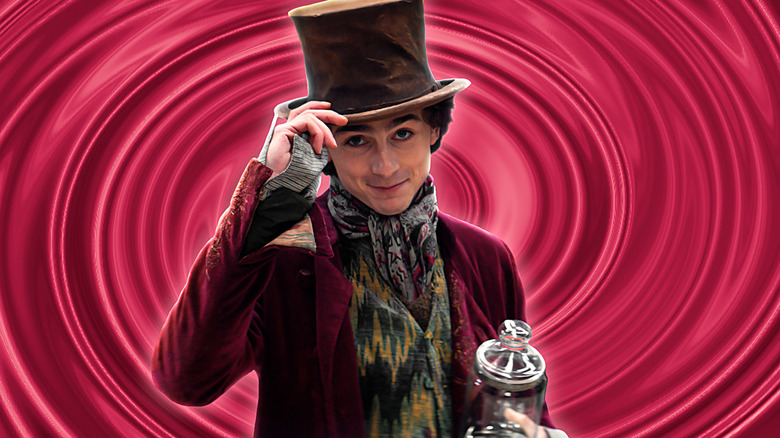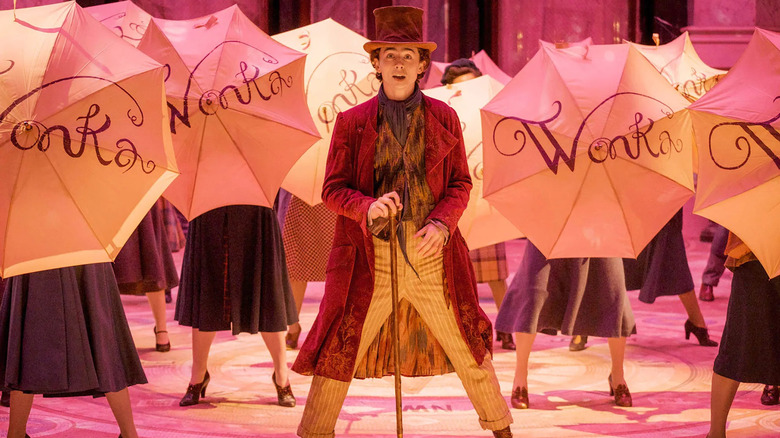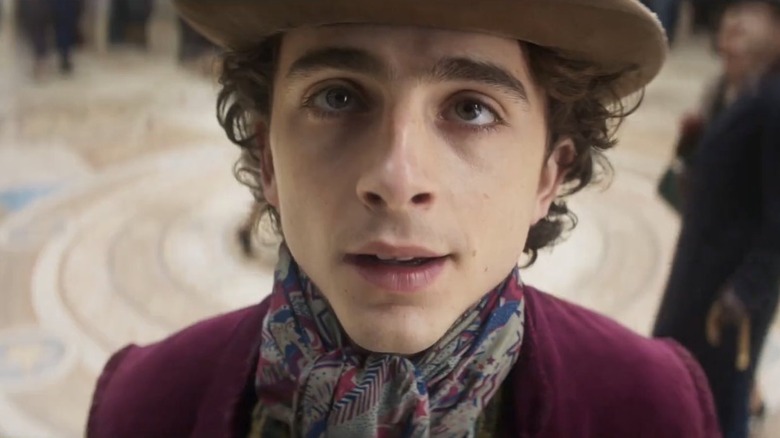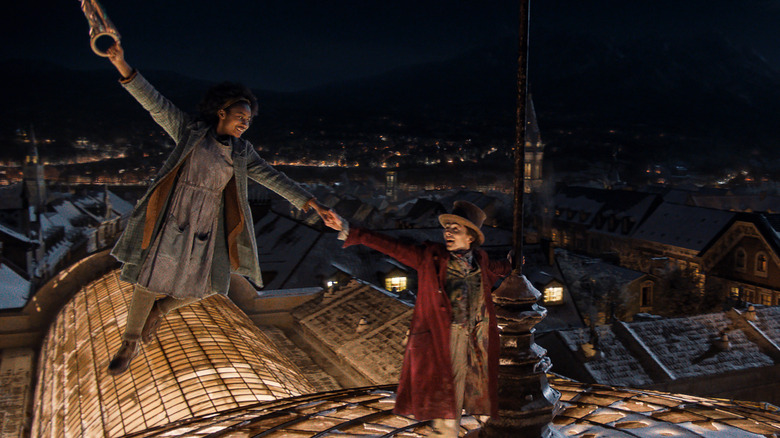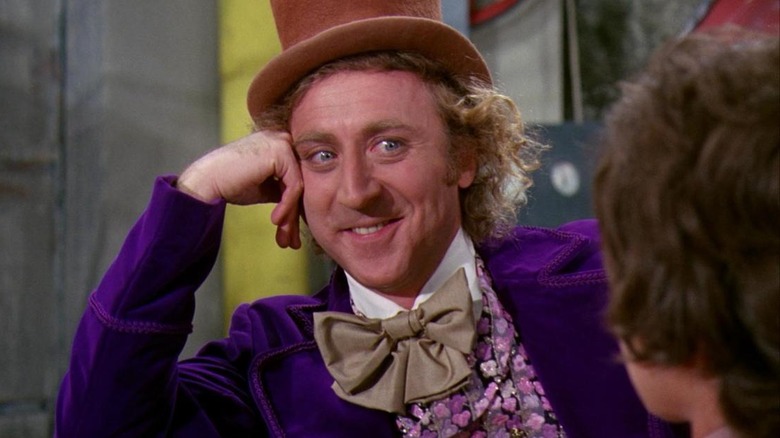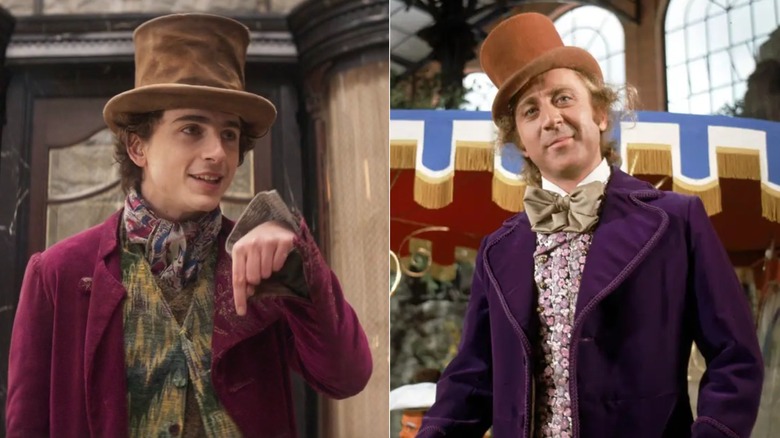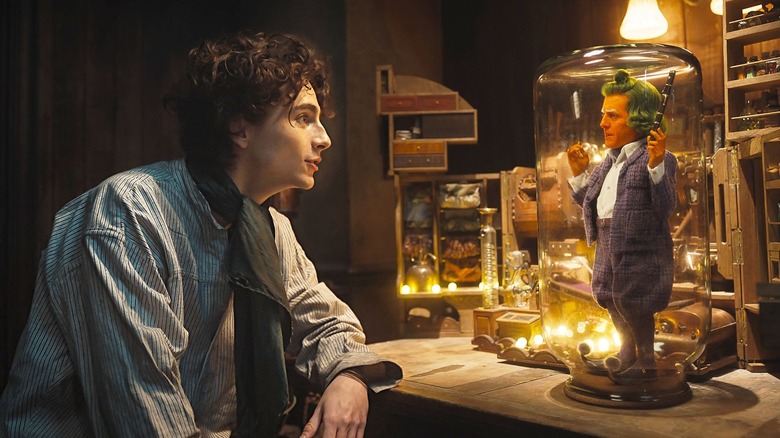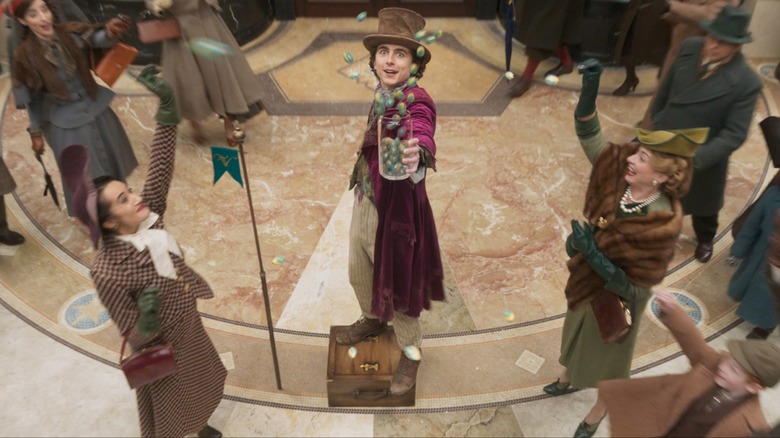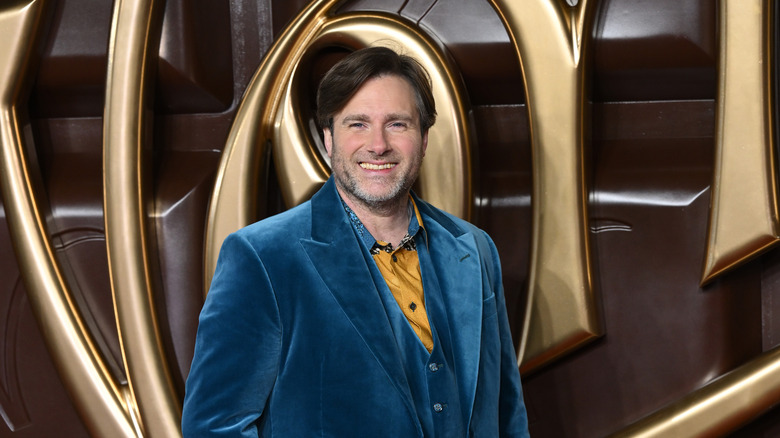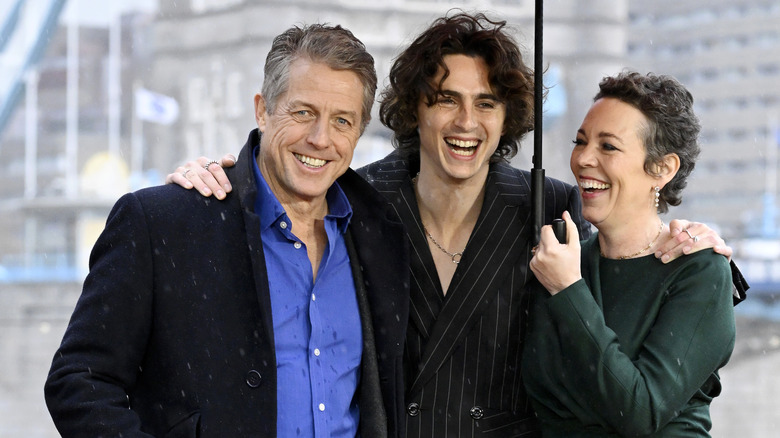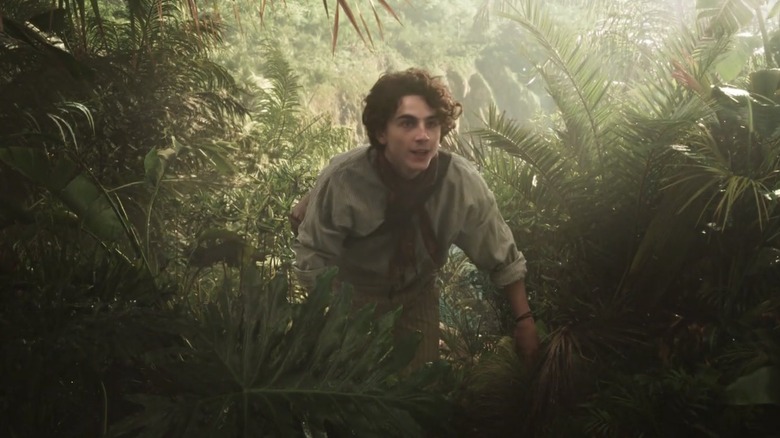The Ending Of Wonka Explained
Contains spoilers for "Wonka"
Writer-director Paul King's 2023 family blockbuster "Wonka" tells the origin story of Roald Dahl's magical chocolatier. Naturally, the film evokes elements of the 1964 book "Charlie and the Chocolate Factory" and, even more directly, the 1971 "Willy Wonka & the Chocolate Factory" movie directed by Mel Stuart and starring Gene Wilder (there are no connections here to the 2005 "Charlie and the Chocolate Factory" movie directed by Tim Burton and starring Johnny Depp). Yet this Wonka, played by Timothée Chalamet, is a different take on the character, inhabiting a more fantastical world in a story that ultimately takes a friendlier tone.
Truth be told, there's not a ton about the film's ending that really demands "explanation" — its messages are delivered so directly that even the youngest viewers will understand everything they're being told. Nevertheless, there is some interest to be had in looking into the ways the ending does or doesn't connect to the classic "Willy Wonka" story, and whether or not Chalamet's Wonka could warrant a full movie franchise of his own. Here's the ending of "Wonka" explained.
What you need to remember about the plot of Wonka
Willy Wonka is an immigrant fresh off the boat in a new land with big dreams of making and selling chocolate, inspired by his mother (Sally Hawkins), but he has no money to his name. Desperate for a place to stay after wasting all his cash, he takes a suspiciously cheap room deal from Mrs. Scrubbit (Olivia Colman) and Bleacher (Tom Davis), unable to read the fine print forcing him into decades of indentured servitude. Wonka's plans to pay off his debts by selling chocolate also face the roadblock of the Chocolate Cartel of Slugworth (Paterson Joseph), Prodnose (Matt Lucas), and Fickelgruber (Mathew Baynton), who are in cahoots with the chief of police (Keegan-Michael Key) and the chocoholic priest Father Julius (Rowan Atkinson) to shut down all competition.
Wonka teams up with Scrubbit's other hapless victims to surreptitiously build their chocolate empire — though they occasionally have to resupply ingredients stolen by an Oompa-Loompa (Hugh Grant) seeking payback for a previous cocoa theft. Wonka's most significant friend in this group is Noodle (Calah Lane), an orphaned girl who teaches him how to read. Wonka's magical confections prove so popular with the public that he's eventually able to open his own store. The opening, however, is sabotaged by the Cartel, who pay off Scrubbit and Bleacher to poison the store's supply with hair-growing yeti milk. At his lowest point, Wonka is given an ultimatum — if he leaves town, all his friends' debts will be paid off.
What happened at the end of Wonka?
On the boat out of town, the Oompa-Loompa catches up with Wonka, encouraging him to fight back against the Cartel. Wonka realizes that Slugworth's signet ring matches Noodle's — it turns out she's Slugworth's niece, and she wasn't freed but instead bought by Scrubbit and Bleacher to keep her out of her family's fortune. Wonka returns to reunite with his friends for a massive heist — involving, among other things, taking a giraffe from the zoo to let loose in a church — to acquire the documented evidence of the Cartel's crimes. They find the documents, but the Cartel traps Wonka and Noodle in a flooding chocolate chamber. The Oompa-Loompa, still on the trail of Wonka's chocolate, ends up rescuing them before they drown. The police turn on their corrupt chief after seeing the evidence, the Cartel leaders are blown away after eating Wonka's levitation candies, and the chocolate explodes into a fountain.
Wonka opens the bar of chocolate he's been saving from his mother, and inside is a golden ticket with a message about what makes chocolate great isn't the chocolate itself, but the people you share it with. He shares the bar with his friends. Telephone operator ally Lottie Bell (Rakhee Thakrar) is able to track down Noodle's mom, allowing for a mother-daughter reunion as Wonka sings "Pure Imagination." Wonka and the Oompa-Loompa make a deal to work together to build their chocolate factory. The Oompa-Loompa sings about the happy endings for the heroes and unhappy ones for the villains over the closing credits.
What the end of Wonka means
"Wonka" spells out its ultimate moral loud and clear, literally writing it on a golden ticket. It's the old cliche of "the real [treasure/magic/best chocolate in the world] was the friends we made along the way," delivered with just enough conviction and earnestness to make viewers' eyes water more than they roll. Wonka's motivation from the beginning is driven by his love for his mother, and though she's no longer with him except in memory, he's now built up a group of friends and has a "found family" he seeks to take care of. The movie also makes clear that you can balance caring for others with pursuing your personal dreams — Wonka was ready to give up the latter for the sake of the former, but he realizes he can do both.
This message is perhaps the one thing the movie has in common with the 2005 "Charlie and the Chocolate Factory." Whereas the book and the 1971 movie use Wonka primarily as an arbiter of sin and virtue for the kids visiting the factory to learn lessons from, the 2005 movie shifts the arc more towards Wonka himself learning the value of family. The difference is that Johnny Depp's version of Wonka learned that lesson at an older age after having a much more fraught relationship with his own family.
Is this ending consistent with other Wonkas?
While the ending of "Wonka" works successfully as a conclusion to the movie's self-contained narrative, it's weird as an origin story for this particular character. Whether you're talking about the book or the two previous movie adaptations, Willy Wonka is a character famous for his mysteriousness and reclusiveness. The Gene Wilder version in particular has a sharp cynical edge — he doesn't even feign caring about kids getting injured on his factory tour, and even Charlie nearly gets screwed out of his reward due to the fine print in a contract he couldn't possibly read.
If "Wonka" is all about a younger Wonka learning the value of friendship, isn't it weird to think he'd later go on to shut himself up in his factory and shun the outside world? Perhaps the Oompa-Loompas would be friends enough for him in his recluse years — his relationship with the Oompa-Loompa in this film is closer to an equal partnership than the uncomfortably slave-like relationships in the source material — but surely he'd want to stay in some contact with Noodle and his other human friends as well, right? Furthermore, it's sad to imagine this version of Wonka, screwed over by contract law in his youth, growing up to be the same man who would try to do the same to other people.
Could Timothée Chalamet Wonka become Gene Wilder Wonka?
It's not really clear whether this is a standalone story about Willy Wonka or intended to eventually segue into the events of the novel and films. Before we dive into the inconsistencies between the different characterizations of Willy Wonka, Paul King's film does offer other points of distinction that might imply this is a different continuity: Where the book explicitly takes place in England and the 1971 movie in the United States, "Wonka" seems to take place in a fantasy setting. Their monetary currency of "silver sovereigns" is fictional. Magic holds a greater presence in this world than it did in other Wonka stories, especially in the musical numbers. The period is also distinctly indistinct, with an anachronistic mishmash of styles and technologies. This film's version of Arthur Slugworth is definitely a different take from the 1971 version.
In his performance, Timothée Chalamet isn't attempting an impression of Gene Wilder; if anything, his exaggerated comic deliveries and good-natured yet foolish characterization feel like they take more inspiration from Jim Carrey's performances. If the Chalamet Wonka is supposed to in fact be a younger version of the Wilder Wonka, then presumably a lot is going to change in his life between "Wonka" and whenever he gives Charlie Bucket a factory tour. Whatever tragedies and betrayals that could turn Chalamet Wonka into Wilder Wonka must make the evolution from "Return of the Jedi" Luke Skywalker to "The Last Jedi" Luke Skywalker look tame and pleasant in comparison.
The Oompa-Loompa is the key to all of this
If the Chalamet Wonka is to eventually become the Wilder Wonka, it would be at least in part thanks to the influence of the Hugh Grant Oompa-Loompa. Though he only appears for brief portions of the film, the Oompa-Loompa turns out to be one of its most important characters in terms of moving the story along. His characterization is in many ways closer to the Wonka audiences already know and love, both in his wittiness and in his extreme pursuit of justice that borders on sadism. By Loompa law, any crime must be met with 1000 times the punishment — the sort of philosophy that might justify turning annoying gum-chewing kids into blueberries or shrinking television addicts by teleporting them into a TV.
It's the Oompa-Loompa who encourages Wonka to fight back against the Chocolate Cartel, setting the story's climax in motion. While this fighting back doesn't escalate into the nightmare fuel of book Wonka or Wilder Wonka's ironic punishments, it does at least push the character a bit closer to classic Roald Dahl-style darkness rather than keeping him purely a figure of innocent whimsy. Combine the Oompa-Loompa's influence with Noodle starting to give Wonka a more proper education on non-chocolate subjects, and you can at least imagine the roots of how this version of Wonka is starting to become closer to the original in some ways — even if the "power of friendship" stuff makes him more different in others.
How the ending's music plays with nostalgia
Whether you consider "Wonka" to be a canonical prequel or an alternate take on the material, its ending banks heavily on nostalgia for the 1971 "Willy Wonka & the Chocolate Factory" with its musical selections. After being interpolated into Joby Talbot's score throughout the film, the closing scenes finally have Wonka sing the classic song "Pure Imagination," which in this context might as well be retitled "Pure Emotional Manipulation." It's followed up in the credits with yet another callback to the old movie's score, with yet another comic variation on the Oompa-Loompa song.
When the trailers for "Wonka" focused on these two iconic tunes while hiding the movie's original musical numbers, it seemed like reason to fear the new songs might not be up to snuff. Fortunately, the seven new songs, composed by Neil Hannon and co-written by screenwriters Simon Farnaby and Paul King, are quite good and serve the story well. Even so, the one-two punch of old-school "Willy Wonka" numbers at the end does threaten to overshadow the new material as far as what's going to be stuck in your head leaving the theater. Viewers who stick through the full credits will at least get to hear the Oscar-submitted original number "A World of Your Own" a second time through.
What has writer-director Paul King said about the ending?
In an interview with Total Film (via GamesRadar+) coinciding with the release of the film's trailer in July, Paul King gave insight into how he went about approaching his conception of a younger Wonka. Doing so was a "challenge," he said. "But I also felt — maybe misguidedly, but just probably from those childhood readings — that I did know who this person was." He pointed to the end of "Willy Wonka & the Chocolate Factory" as proof of how even the aged, cynical version of the character still believed in "goodness, kindness, and hope," which was key to developing his younger version.
Noodle, he explained, was necessary as a "slightly more cynical person" to counterbalance young Wonka's innocence. Even so, King acknowledged, "I'm not sure my soul is quite as dark as Roald Dahl's," which goes some way to explaining why the film ends on such a happy note with Wonka's positivity generally intact.
What Hugh Grant and Timothée Chalamet have said about the film
Hugh Grant's job, both in performing in and promoting Paul King's films, has been to bring his trademark cantankerousness to what could otherwise risk becoming sickly sweet. Speaking to the Associated Press alongside Timothée Chalamet, Grant took shots at the director's perfectionism and the strangeness of playing an Oompa-Loompa, while still making it clear he loved being part of the production.
Talking about the film's moral of "family matters and it's the people you share your chocolate with," he says, "it's not a trite, tacked-on motto. It comes from [King's] heart." Chalamet seconded this assessment that "[King] really means it," while acknowledging he'd be "suspicious" if he heard about it from the outside. Chalamet compared the experience to his work on Greta Gerwig's "Little Women" in terms of being an adaptation of a classic story that's done well enough to overcome skepticism about IP-based movies.
What the end of Wonka could mean for a potential franchise
In another Total Film article, King revealed he was open to making sequels to "Wonka." He pointed out how Dahl, a writer who "didn't really write sequels," nonetheless kept exploring different things he could do with the character of Willy Wonka. He wrote "Charlie and the Great Glass Elevator," featuring Wonka, and even had plans to write a third book in the series, so there's plenty of potential for continuation. "There's an awful lot more Wonka story that we have that we would like to tell," King said. "It's not like 'Dune: Part One' where you go, 'This is what's happening in Part Two.' Hopefully it works exquisitely as a stand-alone movie. But I would definitely like to do more. And I'd like to spend more time in this world, and meet some more Oompa Loompas."
Producer Alexandra Derbyshire seconded the interest in making more "Wonka" films while acknowledging such a continuation would be a challenge, saying, "I think there would be space for a sequel if people really enjoy the film. But there are not many projects that are as world building as this. So I'm slightly concerned about what I can do next!"
Of course, even if audiences aren't so enthusiastic about the film and this ends up being the last we see of Chalamet's Wonka, there is still technically a many-years-later "continuation" of sorts in the form of the original "Willy Wonka & the Chocolate Factory" movie. How closely potential sequels close whatever gap between the original and this prequel remains to be seen — especially if King doesn't want to get into the tragedies implied to befall Wonka in the intervening years.
